Livestock project breeds rewards in Vietnam
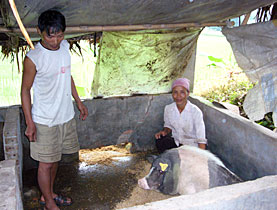
Farmers in Vietnam's remote northern region are finding a way out of poverty as a result of a Swiss-supported project, which encourages them to raise pigs.
It is just one of the schemes benefitting from Swiss Agency for Development and Cooperation (SDC) funds under its Mekong programme. The region is the focus of the SDC’s annual conference, which starts on Friday.
Vietnam – which along with Cambodia, Laos and Myanmar makes up the Mekong – has been undergoing a huge boom of late. But there is still a large gap in wealth between the cities and the countryside.
The rain was pouring when swissinfo visited Cat Thinh, in the northern Yen Bai province. It had taken us five hours by car from the capital Hanoi to reach the village, which is set among the hills and the rice paddies.
There we met Ta Thi Nhyng, a 43-year-old farmer, married with two children, who comes from the Thai minority.
She had just come back from working in the fields and was driving her two water buffalo into the small livestock shed, which also houses her prized sow of the rare Mong Cai breed.
“In 2006 a village project collaborator convinced me to start breeding pigs. This project has allowed me to raise a good quality breed of pigs which I wasn’t able to do before,” Ta Thi Nhyng told swissinfo, as she sat with her husband inside her simply furnished but neat home.
The Ta family’s finances have been greatly improved by raising and selling pigs. Before that they eked out a living from growing rice, maize and tea.
Breeding success
“The proceeds from selling the first litter allowed me to improve the livestock shed and reimburse my loan of 1 million dong (SFr66). I bought new furniture and chairs from the money from the second litter,” said the farmer, who is now waiting impatiently for the third litter.
The Tas are one of 700 farming households participating in the Poverty Alleviation Through Livestock Development (PALD) project, which over the period 2005-2008 has received SFr1 million from the SDC.
The local Women’s Union association plays a key role in the scheme by selecting families based on their economic situation and then handing out the loans, which are used to buy Mong Cai sows.
Farmers’ interests groups represent the families. In Cat Thinh, the group, which is made up entirely of women, meets in the local Communist Party committee headquarters.
“At the beginning I was worried and wasn’t sure if I could do it as I didn’t have any money or knowledge,” said the group’s spokeswoman.
“Now I feel sure and really recommend other families to take part in the project,” added the woman, who bought a motorcycle with the proceeds of her endeavours.
Veterinary services
The PALD scheme, which also covers poultry, provides veterinary services adapted to local needs.
Cat Thinh’s vet is responsible for the artificial insemination of livestock and is tasked with transmitting his knowledge to people in other provinces and districts.
“Taking part in this project has been a very positive experience,” said the vet, Bui Duc Hoa.
“I was trained in how to carry out artificial insemination and received support for buying a Yorkshire breed boar. The price of pigs has risen and we have gained from that,” he added.
The vet said that the interest groups had helped farmers share knowledge and experiences, which did not happen in the past. People can now learn all they need to know very quickly.
In Tan Thinh, the next village we visit, the interest group is also made up of women – apart from one notable exception.
“I am pleased to be able to participate on behalf of my wife, who is extremely busy: yesterday our sow gave birth for the third time – 14 piglets,” explained the lone man in the room.
This village is also full of enthusiasm for the PALD scheme. “I have learned how to vaccinate pigs on my own and how to recognise possible illnesses in time,” says one farmer, who insisted on showing us her house and her soft pink pigs.
“I am happy that I can invest the money earned in my children’s future.”
swissinfo, based on an article in Italian by Andrea Arcidiacono in Yen Bai
Switzerland supports Vietnam in its efforts to reduce poverty and develop the rural economy.
The Poverty Alleviation Through Livestock (PALD) project is carried out in collaboration with the Ministry of Agriculture and Rural Development in three northern provinces: Yen Bai, Phu Tho and Son La.
For pig raising, the priority was to create 26 Farmers’ Interest Groups (FIG) involving 700 farmers. Poultry raising, another part of the project, has suffered a setback due to the reappearance of avian flu in May 2007.
The project is aimed at supporting poor families who have no access to banking sector financing.
Jointly organised by the SDC and the State Secretariat for Economic Affairs (Seco), this year’s Annual Development Cooperation Conference, which takes place on Friday, focuses on the Mekong Region.
Discussions will revolve around two current themes: food security and sustainable globalisation.
Switzerland has been aiding the Mekong region since 1970. It became a priority region in the second half of the 1990s.
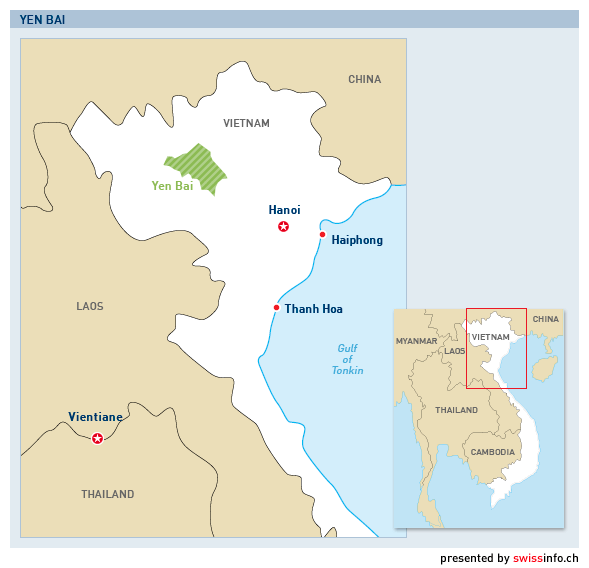
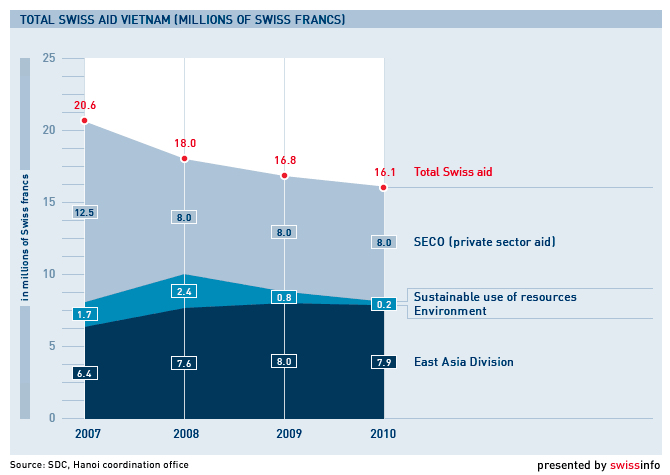

In compliance with the JTI standards
More: SWI swissinfo.ch certified by the Journalism Trust Initiative
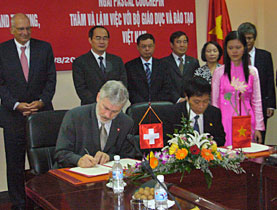
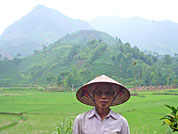
You can find an overview of ongoing debates with our journalists here . Please join us!
If you want to start a conversation about a topic raised in this article or want to report factual errors, email us at english@swissinfo.ch.